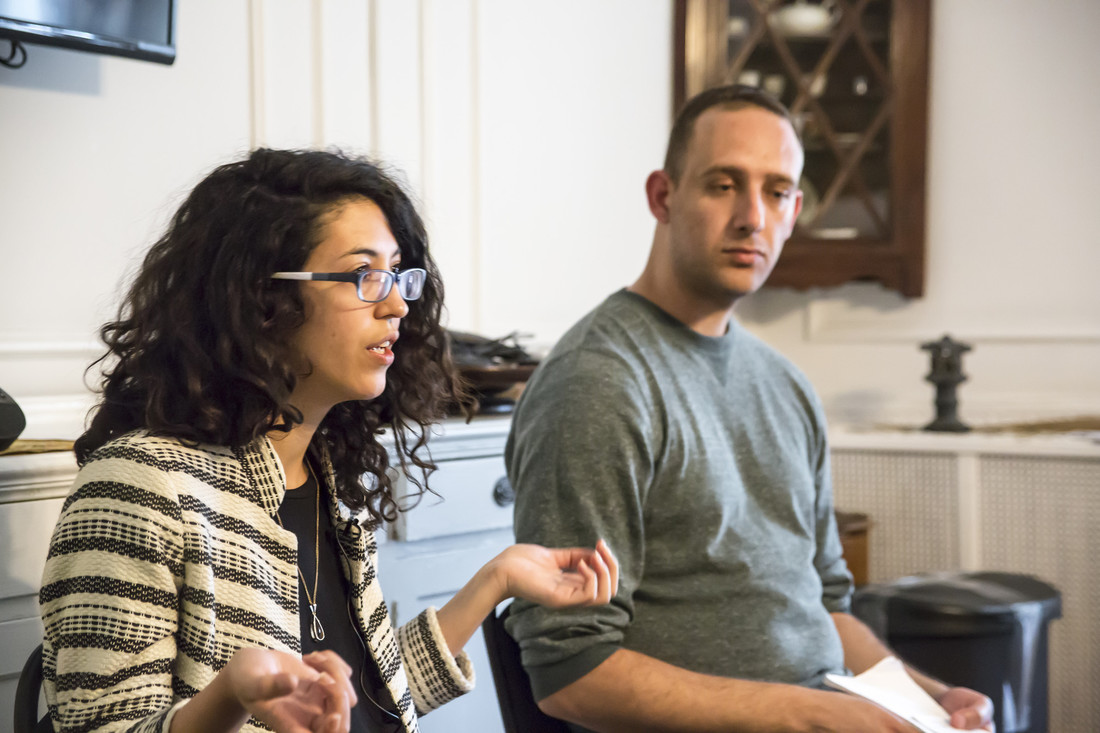
AFSC provides support to conscientious objectors in Israel and works to raise awareness in the U.S., including bringing individuals like Yasmin Yablonko and Khaled Farrag to the U.S. to talk about their experiences refusing to serve in the Israeli military. Lindsay Benson Garrett / AFSC
Many Americans are unaware of the ways in which militarism in Israeli society drives the continued occupation of Palestine and contributes to international conflict. Israel is one of the world’s top arms exporters, including to countries under U.N. arms embargo for human rights abuses.
Within Israel, universal conscription suppresses dissent by encouraging Israelis to accept the military as central to their national identity, and the military is also promoted as a means of social mobility.
AFSC’s Israel Program, however, is working to support Israeli peace activists and draft resisters, and its research offers a window into a more complicated reality. The Israel Program’s recent survey of Jewish Israelis points to differences of experience and divided attitudes toward militarism within Israel.
1. Enlistment rates are declining, and it is a class issue.
Israel is known for requiring all citizens to serve in the Israeli military, but in fact the population of Israelis exempt from the draft is growing. This includes Palestinian Citizens of Israel, Ultra-Orthodox Jews undergoing religious studies, and religious women. Mental and physical health exemptions are also on the rise, in large part due to lower-income youth who seek these easier forms of exemption so that they can continue to support their families. Only about half of younger Israelis serve in the military, and the survey found that younger Israelis reported having more friends who had not served. The survey also found that people with below average incomes were more than twice as likely as those with above average incomes to have friends who had not served in the military, which speaks to the influence of class on conscription rates.
2. Israelis who do not serve in the military are targets of social stigma.
While their numbers are greater than ever, Israelis who do not serve in the military continue to face social disapproval and possible employment discrimination. About half of survey respondents said they would be uncomfortable working with or employing someone who had not served. 67.8% of respondents expressed support for “restricting the human rights” of people who do not fulfill citizenship duties such as military service, with only 24.2% opposing. The question did not define what rights should be restricted, but the result suggests that many still view military service as essential to Israeli citizenship. Having friends who had not served in the military did not affect respondents’ attitudes, highlighting the contradiction between Israelis’ lived experience and the ideal of universal service.
3. Israelis are sharply divided on the question of ending conscription.
The percentage of respondents who supported and opposed replacing conscription with a professional army was roughly equal. Even though many Israelis are open to alternatives, there has been little public discussion on the question of ending conscription.
4. The career benefits of military service are unequally distributed.
Although serving in the IDF is widely viewed as an opportunity to gain job skills and connections, over 60% of survey respondents stated that their military service had not helped them find employment. But there was a notable difference based on the type of service. More than half of people who served in intelligence roles believed that their military experience had helped their careers, but only 33% of combat soldiers and a quarter of people in other roles felt the same. Because a person’s economic background can affect their position in the military, military service may uphold rather than reduce inequality.
AFSC and its partners in Israel hope to use this research in their advocacy to raise awareness about the harmful effects of militarism on both Israelis and Palestinians and amplify the voices of those who challenge its dominance.